Alfie White
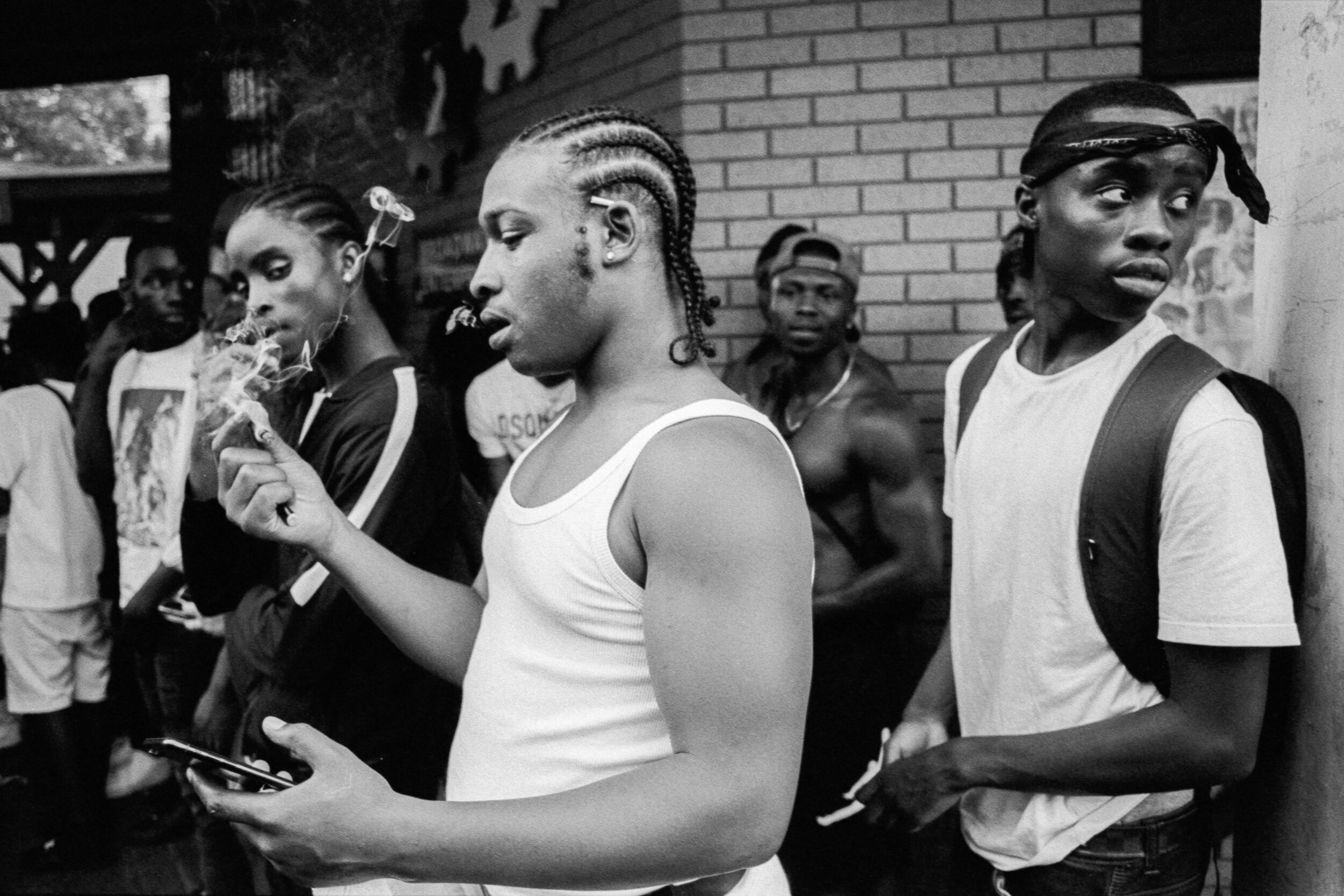
“photos are a way of making sense of it or, if not, then posing that ‘Why?’ in an image.”
Born, raised and based in South London, Alfie White works across mediums of photography, print, writing, and film to explore humanity’s intricacies and nuances, with a focus on moments of intimacy that resonate with him. Drawn towards contemporary youth and its different layers and subcultures, Whites’ work documents the anxieties young people face in contemporary society, both individually and as a larger collective.
Diving headfirst into his photography career, White has assisted on major projects, like the first Dazed+Labs x Converse student shoot, all while still developing his own signature style. During his time at college, he worked part-time at a Snappy Snaps, so developing film was something he was very familiar with, even before he started shooting. White works predominantly with 35mm Black & White film, and develops, prints, and scans his work from in his makeshift home studio.
White’s timeless aesthetic is reminiscent of early social documentary and street photography. White doesn’t describe himself as a street photographer, however. His work aligns with the documentary practice and can be understood as a continuous visual-study on social conditions and humanity as a whole, seen through his lens both literally and metaphorically. White’s approach is one of fluidity and intuition, with little premeditation behind the specifics of what he shoots and has described them largely as a collection of unconnected fleeting moments.
His latest ongoing project has been funded by the Dazed 100 Ideas Fund in partnership with Converse, where he will create two documentary projects: a photo essay on the experiences of people affected by the UK Government’s handling of the Coronavirus pandemic, and a collaborative document showing the experiences of young people across the globe throughout 2020, that will be published later in 2021.
NR Magazine speaks with the photographer to discuss how he sees himself as the person behind the lens.
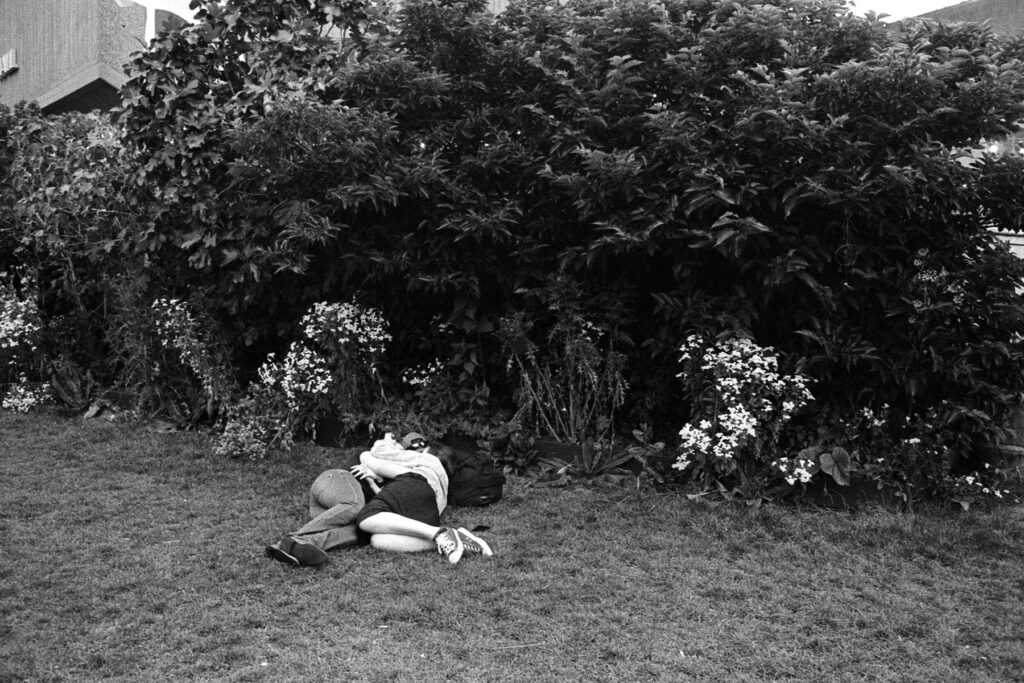
What is it like navigating the creative sector as a young artist?
It’s less navigating and more a seemingly perpetual process of hesitantly stepping into an increasingly darker room; it’s constant guesswork. Lots of emails, lots of negotiating, lots of arguing your own value and lots of people undervaluing you as such.
But it’s also a lot of special experiences, all of which I wouldn’t have had the privilege of experiencing if I wasn’t in this, so it’s also very exciting, especially as I feel that we are at a turning point with the newer generations taking up all these spaces now, and I feel part of that. Not to mention the many wonderful people I’ve met, many of whom I consider mentor figures due to their age and experience in the game. They make that navigation a whole lot easier and just generally worth it.
Does photography help you find moments of refuge in the chaos of London?
It helps me understand it a bit better, or cope with it at the very least. I get quite easily over-stimulated, and I’ve always found that the camera has an effect of nullifying a lot of the stimuli around me, allowing me to zone into one thing. Photography is a way for me to make sense of chaos.
What moments have you captured that you’ve found to be the most meaningful?
I don’t think any moment in particular can be placed above another. That’s not me trying to be abstract, either; I genuinely mean it. They’re all fractions of seconds that I’ve just been lucky enough to capture, and I suppose in that sense,
“it’s more the moments that I didn’t capture that feel the most meaningful, if I were to properly reflect.”
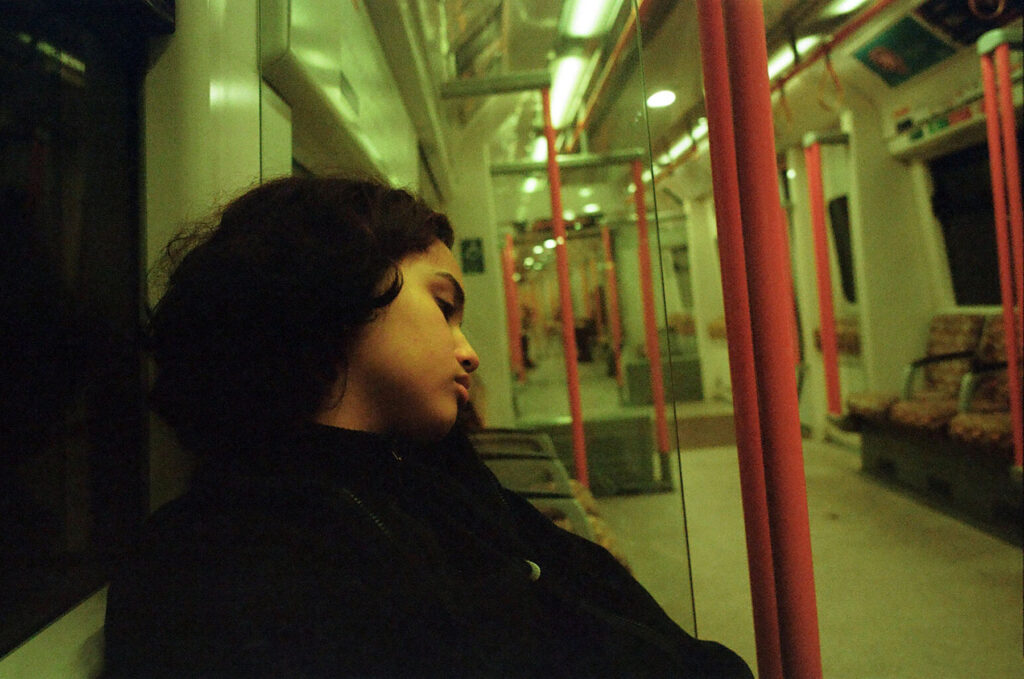
You were awarded a grant from the Dazed 100 Ideas Fund to carry out a national photo essay on those affected by COVID-19. What has it been like working on this project?
It’s been a continuous challenge but has been so rewarding in the experiences I’ve gained and people I’ve met from it, many I consider friends now. These projects of mine are entirely solo gigs, which means that the workload is often intense and spread across a much larger timeframe than a project with a dedicated crew might have, as I have to juggle it around my personal life and other work; but it’s getting to a point where I think I’m beginning to get an idea of what it’s looking like and where it’s going, which is incredibly clarifying.
It’s been a full embodiment of working in silence, working on this project. I’ve had multiple friends and family just assume I’m done with it, as I haven’t said anything. This brings about its own challenges in that until I lay everything out and am able to show someone, it’s just been my eyes that have seen it so far.
With the theme of this issue being Identity, I thought it would be interesting to know your thoughts on how you feel you explore identity and community with your work.
There is a big question mark that looms over most things for me – identity and community especially. I don’t know if I feel a huge sense of community or ever have done, and I don’t know if I’ve felt any sense of identity either, for that matter. Sometimes just the fact that I am real, that I am me, that I exist, is too much to get my head around; let alone that all of that fits under a larger entity, a community.
I don’t think I explore these elements consciously, but more that any exploration of them is done through a natural process of just embracing the subjective and personal, as well as this general curiosity about everything around me. I think I explore these things as they are there in front of me, and simply don’t make sense most of the time.
I use self-portraiture a lot to explore myself—which I suppose is my identity as well—but also how it intersects with my surroundings, which could be my community as well. I don’t feel any attachment to any specific niche of society or community, and it’s in that sense that there’s a level of objectivity involved in this general exploration. I am just here, these things are just there, and I don’t know why, but photos are a way of making sense of it or, if not, then posing that ‘Why?’ in an image.
Getting into photography as a teenager, how has your style and mindset developed as you’ve grown into adulthood?
It’s gone from a hobby to a career, from being something I did on the side to now a cornerstone for my existence and an integral tool in communicating the thoughts and feelings that come with said existence. I take photography much more seriously now, as I do with most things, and the photos are more serious as a result of that. Photography acts as a continuous reflection of my thoughts, feelings and values, and that can be seen in the development of my work and subject matter over time. A lot more thought goes into it now.
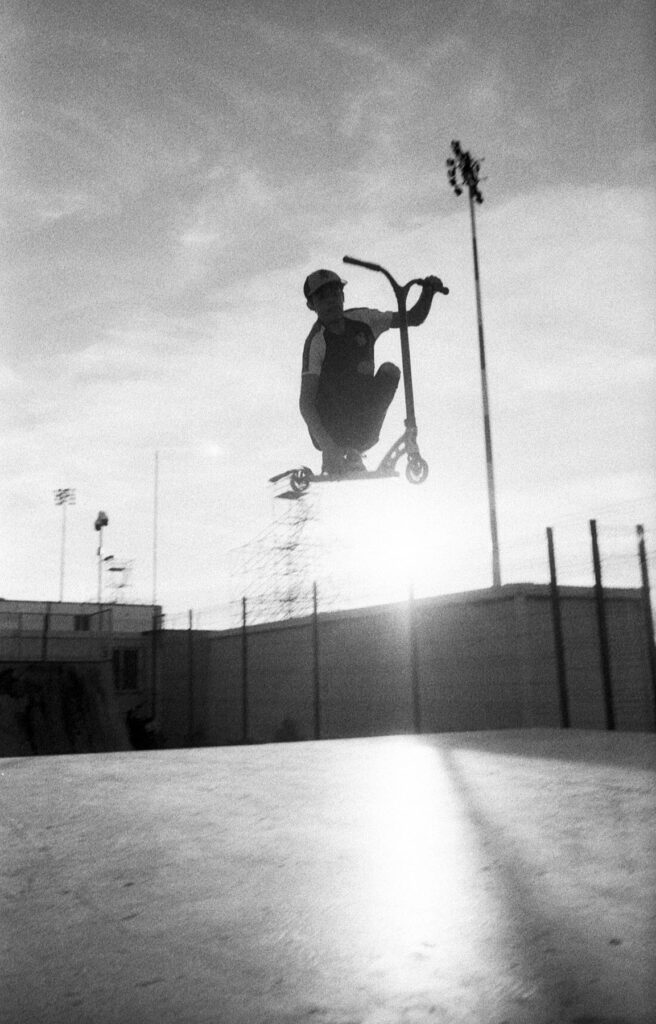
Do you feel a particular responsibility as a photographer? How do you see yourself as the person behind the lens?
I feel a responsibility as a human being before anything, but there are definitely additional responsibilities that come with being a photographer and just making an image of someone, regardless of whether you are a photographer or not. I’m very aware of the potential effect an image has, especially in today’s age, on the person viewing it and on the person in the image, and I try to act as sensitively as possible with this in mind.
I see myself as just myself, as Alfie. I don’t think of myself as a photographer in that sense, but just as me with this tool which, in the moment, is the most effective thing I have at attempting to communicate whatever it is that I’m attempting to communicate. I’m acutely aware of my standing as a cis white male and attempt to operate as respectfully and sensitively as possible with that and how I might be received in mind. But that awareness exists regardless of whether I have a camera in front of me or not; the camera just amplifies the need for it.
Are there any moments where you feel like you hide behind the camera?
I’ve never really felt like I could, even if I wanted to. Perhaps it’s just in my head, but if anything, I feel more exposed when I have a camera round my neck, let alone when I’m taking photos. This kind of follows the sentiment in the previous answer: I will very rarely attempt to operate as a ‘photographer’, firstly as it just feels unnatural, but secondly as,
“I think it’s the lack of detachment in being present—in not being hidden—that allows for more intimate photos.”
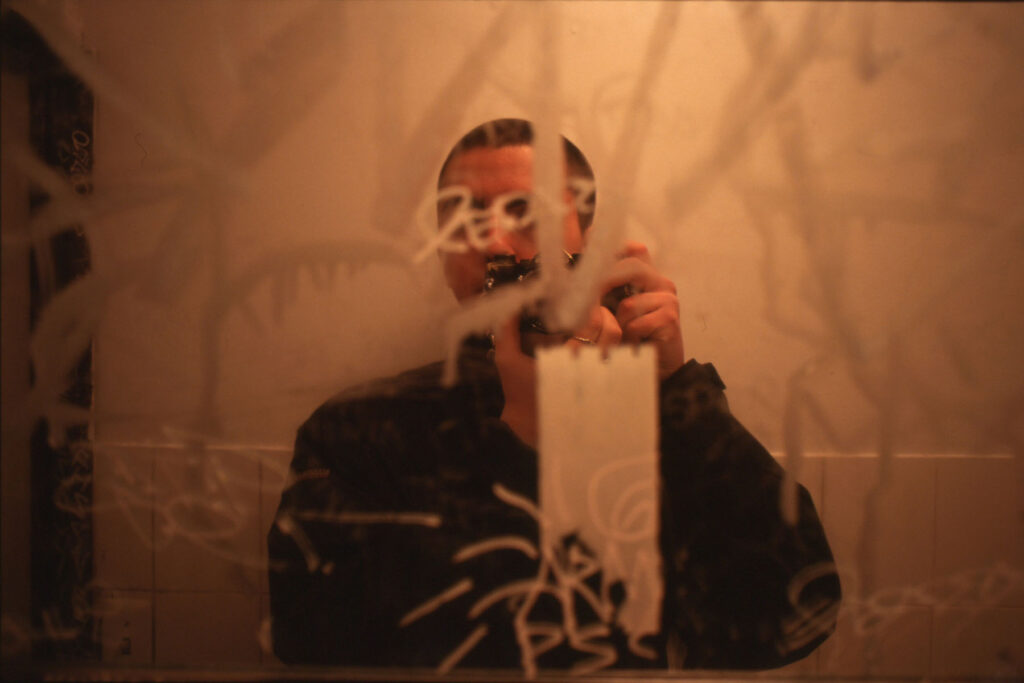
Are there any photos you’ve taken that you feel a certain connection with, or that you feel have resonated with a specific moment in your life?
Oh god, all of them! There’s one in particular that stands out, which I took at a Dazed takeover of an exhibition by Jefferson Hack at 180 Strand, back in November 2019. I was hired to take photos of the night for internal and it was my first time shooting events and using a flash (it had literally arrived that morning).
Anyway, the night went really well, and the photos turned out great, and about 11 months later I was sifting through the negatives from the night to rescan one in particular that I liked. I had been speaking to a girl I had met on a dating app for about a month at this point, and I was randomly sifting through these images from that night when there she is, in one of the photos! It turns out I had photographed her there and didn’t even realise or remember. We have been together for nearly a year now.
The night itself was a flurry of nerves and then excitement, now being one of my fondest memories, as well as later acting as a catalyst to so much more—not to mention that the night itself was a result of so much happenstance, so-much-so that I literally wouldn’t be able to predict what my life would be like if a certain interaction hadn’t happened about 6 months before it.
I try to allow myself to be guided by serendipity and I think this image will always act as a reminder to continue that.
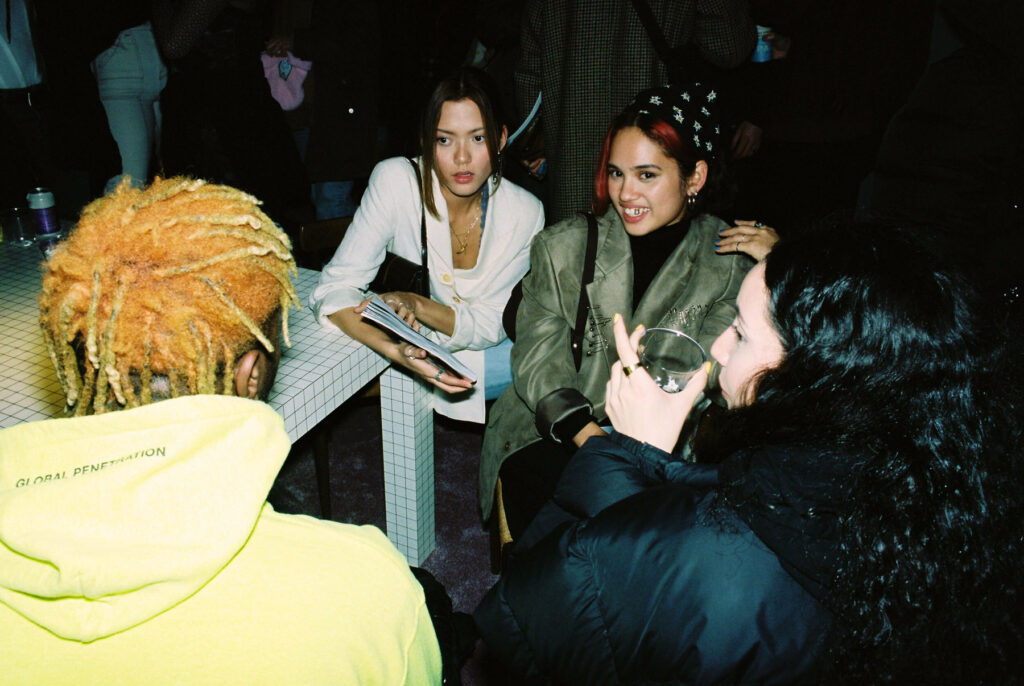
What places would you like to travel to photograph in the future, post-pandemic?
New York and Gibraltar. I miss them both, New York especially.
If you could curate a show that gave people an insight into your identity and process as an artist, what would be featured in it?
Everything: post-it notes, journal excerpts, emails and texts (that I’ve sent), images and videos of mine from my life; scents, sounds. Just something really personal, intimate and immersive. A bit of me.
What’s your relationship like with social media and how it communicates your work to others?
It constantly changes, but I think it’s lost a lot of its importance for me recently and has gone from feeling like the platform to host your work to just a platform that caters for it in another way. I still take it seriously, but I don’t bank everything on it; I’m much more focused on the physical.
The issue with social media is that it is largely geared towards quick engagement. If an image takes longer than a few seconds—maybe even less—to process, then it isn’t ‘good’ in how we interpret that engagement. There’s so much amazing and powerful work that just isn’t fully realised when presented through social media, and it’s why I think books and exhibitions will never be taken over in that sense, because they create a space for complete immersion and concentration that social media (or even websites to an extent) can’t.
But equally, if Instagram suddenly just vanished tomorrow, I really wouldn’t know what I’d do. Perhaps that’s why I’ve found myself subconsciously moving away from social media, to attempt to spread my eggs into other baskets in a way. I know something else will eventually replace them, but when entire networks now rely on just one app and have done for years, how will they transition?
Do you ever go about trying to become a participant in something you’re shooting, or do you prefer to just be a witness?
I’ll always be a participant, but that participation varies on what it is, how I feel, and how much I feel is required from me, just like with anyone else. I’m a pretty quiet person, though, especially in new environments, so I think I automatically take a position as a witness anyway. As I touched on before, though, I’m there as Alfie before anything else.
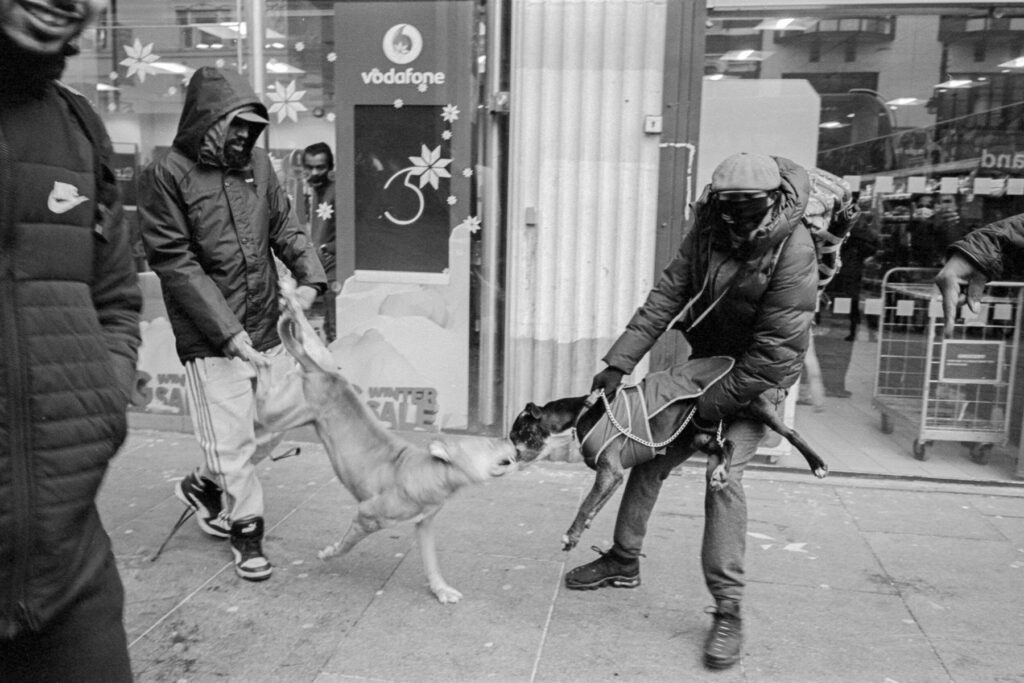
Where do you see your practice heading?
I’m beginning to explore a lot more written and moving image work, and hope that exploration continues. I’m hoping to start thinking of a solo show at some point too.
Regarding photography, just the same as it’s always been, more or less: making images that mean something to me. I want to go deeper, realer; make work with more long-term value. Everything else can fall into place around that.
Credits
www.alfie-white.com
Images · ALFIE WHITE